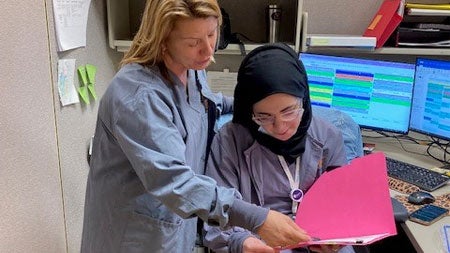In celebration of National Clinical Trials Day on May 20, the School of Medicine would like to recognize and thank our clinical research community – dedicated professionals who help translate basic research done in labs to new treatments benefiting patients. Clinical research involves conducting clinical trials where participants join research studies designed to answer specific questions about whether new treatments or drugs are safe and effective. Clinical research may also include physiology studies, procedure studies, public health studies, or mechanism of disease studies. Clinical trials are a long, careful process that may take years to complete.

Linda Brycland (left) and Nadia Ventura are clinical research coordinators.
A clinical trial starts with physician investigators and/or industry sponsors who develop the protocols for the study, but the trials wouldn’t be possible to conduct without clinical research coordinators (CRCs). The role of a CRC is essential for guiding the study to completion, by first and foremost working with participants and their families.
Clinical Research Coordinator Gabrielle Laskey stated, “The biggest joy for anyone who works in clinical research at the University of Virginia comes from two places: the participants we serve, and the people we work with.”
CRCs work closely with participants to help them understand study protocols and medical jargon in consent forms, schedule their study visits, and review and prepare documentation. The CRCs are the go-to person for anything that arises during the trial that needs to be addressed or coordinated. The CRCs become “fierce protectors of their participants, their physicians, their data, and carry the utmost ethical and professional behavior in their role,” said Laskey.
Another important responsibility of CRCs is to ensure each study is conducted in compliance with study protocols as well as Federal, State and local regulations. CRCs are trusted to correctly report the data derived from procedures, so outcomes and conclusions the clinical researcher submits are accurate and reliable.
According to Clinical Research Coordinator Katie Sullivan, “A CRC’s mantra is ‘patient safety and data integrity before all else’ – a commitment that is crucial to developing trust and respect with participants, researchers, and the people who provide the sponsorship for each clinical trial.”
Clinical Trials Coordinator – A Rewarding Career Opportunity
There are over 200 CRCs at the School of Medicine and we are actively recruiting for new professionals to serve in this critical role in support of the SOM’s overall research capabilities.
To address some of the market challenges in recruiting and developing these positions, the SOM’s Clinical Trials Office (CTO) partnered with HR to develop opportunities to increase the visibility, outreach, and talent pool for CRCs.
Through that partnership, we developed a CRC-focused recruitment website to highlight the potential opportunities in the CRC career path. The site provides an overview of the CRC career field and testimonials from current staff. In addition, it includes an infographic that features the various CRC levels, allowing prospective applicants to determine the CRC-level that aligns with their skills and experience. In a future state, we hope to include content that further highlights the CRC career field, such as “day in the life” video and an infographic that outlines the career progression for a CRC.
SOM also contracted with a third party vendor to strategically source CRC recruitment, with a specific focus on sites like Google, LinkedIn, and Indeed, targeting those individuals with job titles and skills that align with CRCs.
Another part of this work involves exploring opportunities for pipeline planning. The CTO has taken the lead on several opportunities, such as connecting with the Piedmont Virginia Community College (PVCC) Medical Assistant training program. Through this connection, SOM representatives will speak to several of PVCC’s cohorts about the CRC career path. The goal is to generate awareness and interest about the exciting career field of clinical research for program graduates.
Gratitude for Clinical Research Coordinators
Clinical trials date back to 1774 when Dr. James Lind, a ship’s surgeon in the British Royal Navy, conducted a randomized study to treat scurvy. Clinical trials have led to the discovery of many treatments for a range of medical conditions in the past 275 years. The School of Medicine is grateful for our clinical research community and especially clinical research coordinators who play a huge part in the successful coordination of clinical trials conducted at UVA Health today.
